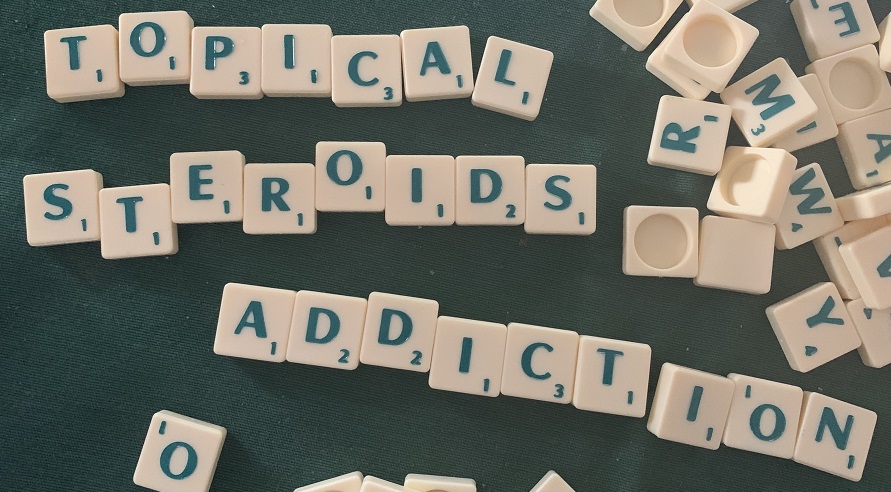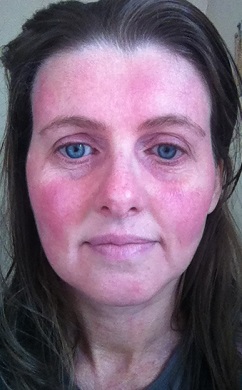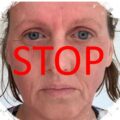
And my continuing fight with addiction
I’m an addict. There. I’ve said it.
I’ve been addicted pretty much all my life.
My parents got me my first hit and it was amazing. I couldn’t believe the high. Suddenly my skin was smooth, no eczema and I could enjoy life again. But over the years (probably 40+ years), it got to the point where I was so hooked I couldn’t go a week without using.
I tried to clean up my act a few times and did manage a few years without using. But eventually I’d flare up, my skin would get so bad I’d need them again.
And my dealer was always so happy to oblige. Of course he was. That’s how the system works.
Get you into it gently, and then before you know what’s happened there’s no going back.
You are addicted to topical steroids and there is nothing you can do about it.
But with topical steroids it seems the body is addicted, not the mind. My brain doesn’t want to me to use them but my skin is craving it like nothing else.
Protopic withdrawal is worse!
I was also prescribed Protopic, which I used mostly on my face and neck. It’s an immunosuppressant, not a steroid and I’ve read that withdrawal from Protopic is worse than from topical steroids… brilliant! A double whammy for me then!
It’s not really a drug though right?
And it got me thinking. Yes I was addicted to topical steroids but it wasn’t like other addictions. With drugs, alcohol, gambling, sex etc. you use the drug to escape, you get pleasure from it and you enjoy it.
With topical steroids that part of the addiction is missing. We never craved or wanted this drug. We just wanted a normal life, and for a while topical steroids worked.
But they should never be prescribed long term.
What’s addicted is the body, not the mind. Which actually makes them easier to quit in many ways. There are no mental cravings. Not for me anyway. Once I’d faced the beast in the eyes and decided to quit, there was no going back. No matter how much it hurt or burned or disrupted my life, I wasn’t going back. I’m never using topical or oral steroids again.
But how does TSW compare to other addictions?
Typical alcohol addiction facts
If you were addicted to alcohol you could join Alcoholics Anonymous (AA) and get help from recovering addicts using the 12 step process. Typically withdrawal takes 30-90 days and programs are available across the country.
The huge difference here being that alcohol addiction is recognised and there is treatment. And withdrawal takes anything up to six months. You can get your head around that. It’s a long time but it’s a doable goal, it’s achievable.
You will have to deal with cravings, temptations, tricky situations but your appearance will not change. You will not be in constant pain, unable to sleep and embarrassed to leave your home due to how your skin looks.
Typical heroine addiction facts
Withdrawal begins about 6-12 hours after your last hit. Usually people get through withdrawal in about 7 days but it can take weeks or months in serious cases. If you can afford it you can check into any number of clinics for rehab. Not so for topical steroids. We are just left to get on with it.
And again, cravings and the pull to use again can be powerful at times of anxiety, hardship and depression. The mental aspect is probably the hardest to overcome, from admitting you were addicted, getting help and sticking to the abstinence.
Typical TSW addiction facts
Symptoms begin after days or weeks of stopping. They vary in severity but most people experience a break down in their skin, splitting, oozing, burning, crusting and flaking for anything from 6 months to 5+ years and counting. There is no medical support. The only support available is provided voluntarily by people who have got through addiction and share help on social media channels. There is a charity called ITSAN which offers online guidance.
But basically. You’re on your own
Your doctor will likely think you are crazy and constantly encourage you to use again and again.
And I think that’s the hardest part of this. Having NO real medical acceptance that this is even a thing.
Add that to the fact that these drugs don’t come with any warning that they might be addictive. And whilst the small print on the medicine guidelines does advise limited short term use, medical professionals are giving us the opposite advice. So who do we trust? We trust our doctors and we keep using.
Other treatements are available such as oral immo suppressants such as Methotrexate and Cyclosporine and Biologics like Dupilomab… but what happens with these drugs over long term use? What happens when the patient stops using them? For me, coming off Methotrexate after getting shingles threw me straight back into TSW again.
So please bear with me. I’m an steroid-aholic. I’ve been clean from topical steroids since February 2019 (ten months) and have no plans to use ever again.
I might seem OK but I do not sleep for more than about 3 hours a night, sometime less. My skin hurts most of the time and itches constantly. I am exhausted and just trying my best to get through this with a smile on my face. Just give me a hug and big of slack and understand if i cancel on you, I don’t want to but sometimes I just crumble under the relentless withdrawal side effects.
Are you a drug addict? Have you quit using any addictive medication? What was it like? Do yo agree that cutting out topical steroids is the most barbaric and brutal withdrawal out there? It takes a strong person to even embark on this journey…
Please comment below…












Brilliant post, Ruth, well done. I am sorry you are struggling with it though. I think I’ve said before so apologies for repeating: instead of taking extra external steroids, first make sure you have the ability to make enough of your own natural body steroid: cortisol. I routinely test cortisol levels in eczema patients and find the adrenals are hypo-functioning and people are not producing enough of their own. It’s pretty easy once you know that to boost adrenal output and get cortisol levels up. It’s not always enough but it can certainly help! You would do a standard adrenal test as here: https://purehealthshop.ecwid.com/Adrenal-&-Thyroid-Tests-p48202785 (delete if this isn’t allowed of course, just wanted people to know what I was on about and have some practical information on what to do!). If the cortisol comes back high, it is a reflection of chronic or acute inflammation. In that case, you then look for the cause of that, which is invariably food/chemical sensitivity, infection and stress as the key ones. Keep on keeping on. Sorry for ranting, I couldn’t resist
Hugs x
Hi Micki, thanks for the lovely comment. Boosting adrenals has to be a good thing. I’m working with the Eczema Expert to look into this. I’ll get my body working properly again if it kills me. Thanks for the links to the tests. I’ll check them out.
It is awful to hear your experience Ruth. It is partly that risk vs benefit equation that is generally impossible to fathom when suffering from a condition and being advised to use a particular medicine. You WANT to get rid of the disease symptoms but treatment often can come with side-effects. It is a great shame that there have only recently been advances in eczema treatments in terms of monoclonal antibody therapies which may not be for every severe case.
I have to note that for many patients with eczema, a planned, well adhered to regimen of local corticosteroid treatment that is regularly monitored by an expert or specialist GP (how often is this available?!) genuinely helps mild to moderate symptoms.
One of the best moments for me ever at work was the young teen girl who cried with joy on a return visit after an eight week trial of topical steroids had changed her life. It was the worst child case I had seen as her awfully dry, sensitive skin which was red, inflamed, caused very bad itching. Not only had it led to darker coloured patches of skin but there were areas of rough, leathery & scaly patches of skin, oozing & crusting, Post first treatment it was near to normal, after years of self image issues caused by horrid peers mocking her previously obvious facial & hand/wrist symptoms (a significant area of the body was affected too). No more blood on sheets or disturbed nights, she was a new person!
Having lost touch with the patient means that I cannot comment on how she is now…perhaps she doesn’t have the eczema problems of her early years now…or perhaps she does. Perhaps she has developed long term side effects of topical steroid use, perhaps not. It is a sad fact that there is not currently a cure for eczema, just treatments that sometimes control the symptoms. It is not true for everyone that topical steroids are a God send, neither is it best for everyone to rule them out due to possible or actual side effects.
My heart goes out to all those with this truly debilitating, life effecting disease that cannot be easily resolved. Most eczema seems to be auto – immune related, rarely linked to food allergy, hereditary, genetic in origin hence no easy answers. As a nation we would do well to take this seriously in terms of research – and that means money.
You are a champion for people Ruth and have so much real experience to share. Thank you for your helpful messages.
Sincerely
Andrew
Thanks Andrew. And I agree. I too thought steroids were a godsend at the time. But looking back, when I was first prescribed them doctors told me it would not be related to my diet. I know this to be incorrect now. Had I been encouraged to explore my diet and other contact allergen triggers back then could I have avoided having to use them? I’ll never know. I think, like you, lots more research is needed. I am certain there is some root cause of it for everyone, it’s just so hard working out what. I don’t believe that anyone ‘just has eczema’. That’s just not good enough. And doling out topical steroids is just creating a major catastrophe in the future. How many more will be faced with what I’m going through? Or alternatively, continue to stuff their body with stronger and stronger steroids which just mask an underlying problem which is never resolved. I worry greatly too about Protopic which I think is causing my worst withdrawal symptoms. And methotrexate, cyclosporin and Dupilomab are also masks… what will the long term effect of using them be? What happens when people can’t use them any longer? I don’t have any answers but will continue to share my journey here till you’re all bored rigid with me going on and on and on… thanks again. I always love your well thought through comments.
Your post opened my eyes to this addiction; I had no idea. From experience with eczema began when I was a young child and over 5 decades I have realized my eczema triggers – soaps, hot water, stress and certain foods (soy and wheat). I would venture to guess you have already realized what sets off your eczema and makes if flare. Have you tried ‘Ceela Naturals’ products? I am fully invested in these products for their ability to lessen flares (magic calm product) and clean then hydrate my skin. I highly recommend to you to manage your eczema. There are samples you can purchase so you don’t invest a ton of money until you know the products work for you. You can call or write your questions to the founder, David Changaris. He is a neurosurgeon and physician. Check him out on LinkedIn. I sincerely hope this will help you with controlling your eczema so you never have to go back to steroids. In addition to Ceela Naturals I use pure shea butter on top of moisturizing products to lock in moisture. It really helps, no petroleum, no additives. Wishing you well.
Hi Julia, thanks so much. I’m actually doing a lot of work with Rebecca, The Eczema Expert, looking at cleansing, flushing and healing my organs and the largest organ, my skin! I will definitely check out this stuff. Sounds perfect. I’m off to find him on LinkedIn now! Thanks again. In a kind of healing crisis with a face on fire at the moment but hoping this means healing and recovery in the not too distant future.